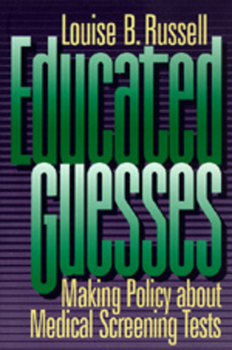Educated Guesses: Making Policy about Screening Tests
Select Format
Select Condition 
Book Overview
A copublication with the Milbank Memorial Fund
Prevention is the best cure-or is it? As medical experts hammer home the importance of annual medical checkups and routine screening for everything from high blood pressure to cancer, Americans have come to believe that frequent screening tests are essential for saving lives. But just how effective are the tests that we have come to take for granted? In this provocative book, medical economist Louise Russell challenges the standard wisdom that more is necessarily better by examining three routinely administered tests-those designed to detect cervical cancer, prostate cancer, and high levels of cholesterol.
Standard recommendations such as annual Pap smears for women and prostate tests for men over forty are in fact simply rules of thumb that ignore the complexities of individual cases and the tradeoffs between escalating costs and early detection, Russell argues. By looking beyond these recommendations to examine conflicting evidence about the effectiveness of screening tests, Russell demonstrates that medical experts' recommendations are often far simpler and more solid-looking than the evidence behind them. It is not at all clear, for example, that annual Pap smears are effective enough in reducing deaths from cervical cancer to justify the enormous additional costs involved in testing all women every year rather than every three years. Nor is there solid evidence for the value of prostate cancer screening, despite recommendations that all men over forty be tested annually.
The three case studies presented here, each important in its own right, raise serious questions about how tests are evaluated, recommendations formed, and medical resources allocated. At a time when American health care policies and the escalating costs of health care are the object of renewed scrutiny, Russell's challenge to conventional wisdom is especially important. Based on a detailed analysis of the available medical research, yet written in a straightforward, jargon-free style, Educated Guesses will be required reading for all those concerned about making informed choices about health care policies and their personal health.
Prevention is the best cure-or is it? As medical experts hammer home the importance of annual medical checkups and routine screening for everything from high blood pressure to cancer, Americans have come to believe that frequent screening tests are essential for saving lives. But just how effective are the tests that we have come to take for granted? In this provocative book, medical economist Louise Russell challenges the standard wisdom that more is necessarily better by examining three routinely administered tests-those designed to detect cervical cancer, prostate cancer, and high levels of cholesterol.
Standard recommendations such as annual Pap smears for women and prostate tests for men over forty are in fact simply rules of thumb that ignore the complexities of individual cases and the tradeoffs between escalating costs and early detection, Russell argues. By looking beyond these recommendations to examine conflicting evidence about the effectiveness of screening tests, Russell demonstrates that medical experts' recommendations are often far simpler and more solid-looking than the evidence behind them. It is not at all clear, for example, that annual Pap smears are effective enough in reducing deaths from cervical cancer to justify the enormous additional costs involved in testing all women every year rather than every three years. Nor is there solid evidence for the value of prostate cancer screening, despite recommendations that all men over forty be tested annually.
The three case studies presented here, each important in its own right, raise serious questions about how tests are evaluated, recommendations formed, and medical resources allocated. At a time when American health care policies and the escalating costs of health care are the object of renewed scrutiny, Russell's challenge to conventional wisdom is especially important. Based on a detailed analysis of the available medical research, yet written in a straightforward, jargon-free style, Educated Guesses will be required reading for all those concerned about making informed choices about health care policies and their personal health.
Format:Paperback
Language:English
ISBN:0520083660
ISBN13:9780520083660
Release Date:February 1994
Publisher:University of California Press
Length:148 Pages
Weight:0.40 lbs.
Dimensions:0.4" x 5.5" x 8.2"
Customer Reviews
1 rating
The problem with standardized medical tests
Published by Thriftbooks.com User , 19 years ago
This very interesting book looks at the other side of standardized medical tests, in this case PAP tests, prostate tests and cholesterol quantification. It gives a provocative look at the validity and accuracy of these tests that so many consider normal, required measurement of health function. Based on false positive, false negative and cost/benefit analysis, these tests no longer appear as fool-proof as we've been lead to believe and their use as predictors of disease is not convincing.






